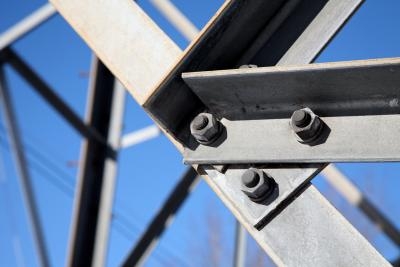
Fasteners are made from a wide variety of materials like steel, titanium and plastic, all with different benefits and concerns. A common fastener is made from steel, varying by different grades. Grade 2 steel is the most affordable, while Grade 8 is heavily reinforced but has a higher cost. Deciding between Grade 8 bolts and yellow zinc-plated fasteners really relies on cost concerns and personal preference.
According to K-T Bolt Manufacturing Inc., Grade 8 bolts "are used in demanding applications such as automotive suspensions. Grade 8 bolts have 6 evenly spaced radial lines on the head." Unlike stainless steel, which is highly resistant to corrosion, steel, however reinforced, will oxidize over time and rust. Grade 8 bolts that are not galvanized or plated with yellow zinc, however, are cheaper.
The yellow zinc plate on steel bolts counters the steel's vulnerability to corrosion from water contact. K-T Bolt Manufacturing Inc., states the bolts are "electro-plated with zinc for better corrosion resistance." The yellow zinc plate gives the bolts a golden sheen. This makes the bolts rather corrosion-resistant; however, the bolts will eventually rust if the coating is damaged, scratched off or exposed to high saline environments.
A zinc coating on the bolt both modifies how the fastener interacts with the bearing surface and, according to Fastenal's Engineering F.A.Q., the "coating or plating changes the surface of the fastener. In general, most coatings increase the lubricity of the fastener over the clean and dry condition." This means there is a lessened requirement for energy input because of lower friction and surface roughness. In effect, a lower torque is required.
The appearance of all three vary, but besides aesthetics, the two plating choices vary from the steel bolt. Clear zinc bolts have a lower "corrosion resistance," according to Fastenal. The clear zinc bolts are required to remain rust-free during a salt-spray test. Yellow plated bolts have to last 600 percent longer before red rust can appear during the same test. Steel bolts vary under the test, with some bolts lasting only three hours.